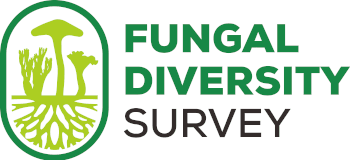Find & Contact a Fungarium or Herbarium
Find a Partner Fungarium or Herbarium
Fungal specimens that have been documented online and sent for sequencing should be stored in an institutional repository whenever possible. They are more valuable to science if future mycologists can examine the specimen from which the sequence was derived.
Such a repository is called a herbarium, or if it contains only fungi, a fungarium. Many fungaria/herbaria digitize their specimens and upload the data to a central website called MyCoPortal, where scientists look for specimens to study, or to better understand the distribution and seasonality of fungi.
Try to find a fungarium/herbarium near you, or near where you collected the specimens, because depositing your specimens locally facilitates regional studies.
- Check the map of North American fungaria/herbaria below.
- If you are unable to find a regional partner collection for your project, the Botanical Research Institute of Texas (BRIT) collection has generously agreed to take deposits of FunDiS specimens.
- Or email fungarium@fundis.org for assistance.
Below is a map and list of North American fungaria that have taken specimens from FunDiS projects or filled out a form indicating willingness to do so. Contact information provided to FunDiS is shown by clicking the appropriate map pin on the map. Updated information on all North American herbaria can be found at the MyCoPortal collections index.
Index Herbariorum is an online guide to the world’s herbaria.
At this website you can enter the code (as in parens below) to find more information about the collection,
such as the location, and the email address of the contact person.
Acadia University, E. C. Smith Herbarium (ACAD)
Botanical Research Institute of Texas (BRIT)
Brown University Herbarium (BRU)
Carnegie Museum of Natural History Herbarium (CM)
College of the Atlantic, Acadia National Park Herbarium (HCOA)
Denver Botanic Gardens, Sam Mitchel Herbarium of Fungi (DBG)
Duke University, Herbarium Fungal Collection (DUKE)
Harvard University, Farlow Herbarium (FH)
Iowa State University, Ada Hayden Herbarium (ISC)
New York Botanical Garden (NY)
New York State Museum (NYS)
Purdue University, Arthur Fungarium (PUR)
Purdue University, Kriebel Herbarium (PUL)
Royal Ontario Museum Fungarium (TRTC)
Santa Barbara Botanic Garden (SBBG)
United States National Fungus Collections (BPI)
University of California, Berkeley, University Herbarium (UC)
University of California, Irvine Herbarium (IRVC)
University of Florida Herbarium (FLAS)
University of Illinois, Illinois Natural History Survey Fungarium (ILLS
University of Michigan Herbarium (MICH)
University of Montana Herbarium (MONTU)
University of South Florida Herbarium (USF)
University of Washington Herbarium (WTU)
University of Wisconsin-Madison Herbarium (WIS)
Virginia Tech University, Massey Herbarium (VPI)Contact a Fungarium
Reach out to a local fungarium/herbarium soon after you start your project, to establish a relationship. This relationship will be one of the most important parts of your project going forward. Email is typically a good way to begin the interaction. An initial message should outline who you are, what your project is focused on (taxa and region), and what your project goals are. Here's a sample message:
Hello,
My name is _________ and I have started a project with the Fungal Diversity Survey (FunDiS.org). Our project is called _______ and is focused on [insert taxa] of [insert target region]. Our project is currently looking to establish a relationship with a fungarium to store our dried fungal collections. We currently plan on collecting [insert number] specimens per year as a part of this project. Our specimens will be associated with all the metadata required by the FunDiS, and will arrive at your location organized to the standards required by your institution. Would your institution be willing to consider accepting our specimens? May we begin a discussion on the requirements your institution has for accepting new specimens?
Thank you for your consideration,
[name]
Please remember that a fungarium is not required to accept your specimens as a part of this project. They can discontinue the acceptance of new specimens at any time or they can reject a particular specimen. Thus it is vitally important that you thoroughly understand the requirements that are specific to your collection partner, as these vary from institution to institution. It will be incumbent upon you to maintain a good working relationship with this partner.
Fungaria/Herbaria are almost never adequately funded, and reluctance to accept your specimens may relate to limited funding for supplies to store your collection, and labor to process and incorporate them. If you plan on collecting and sequencing large numbers of specimens, finding a partner fungarium may be more difficult because of these related costs.


